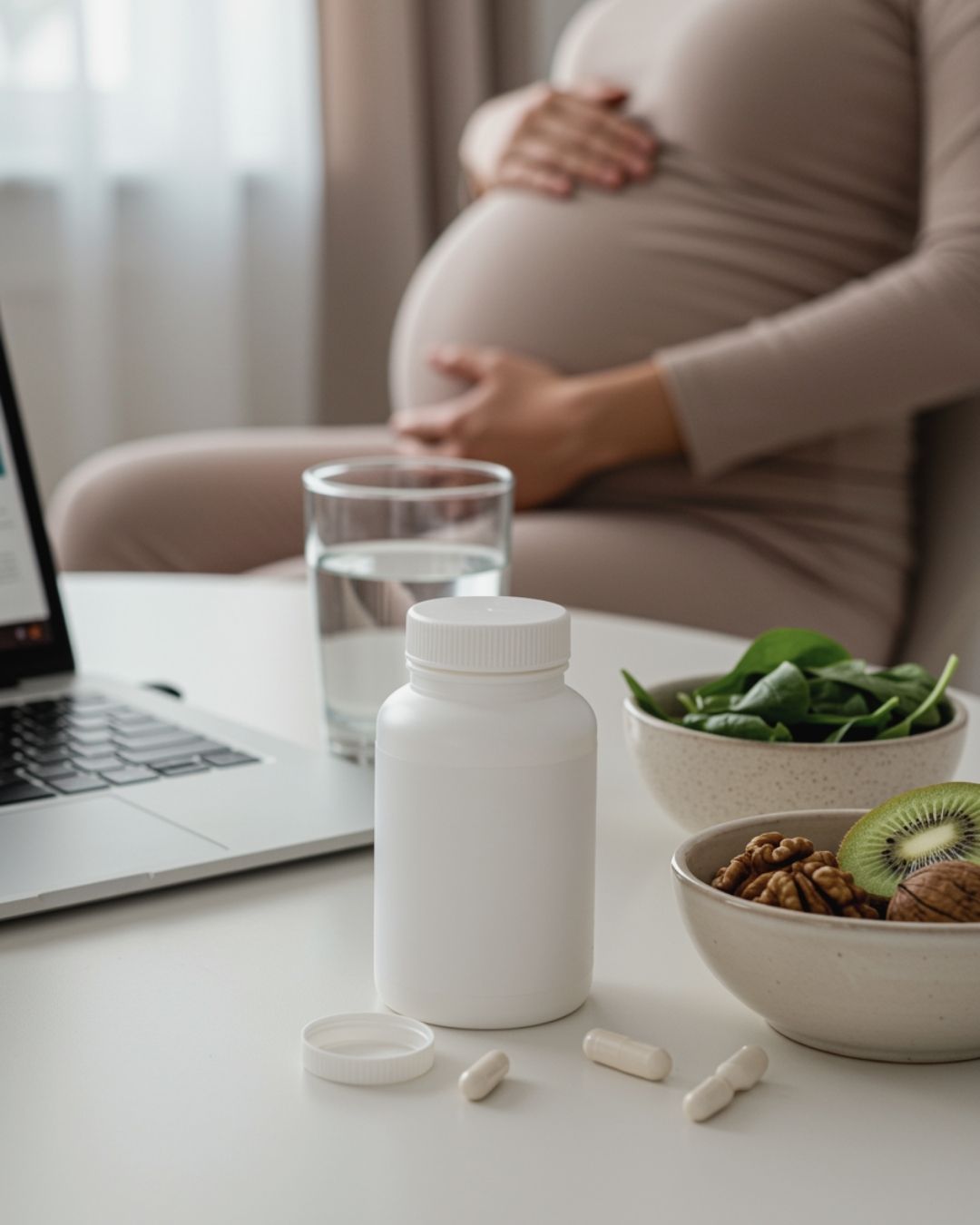If you’ve been keeping up with Lauryn‘s pregnancy journey, you probably know by now how important pregnancy supplements are. Today, we’re going to talk about one of the most commonly recommended prenatal vitamins, folate. This is an essential nutrient during the early days of pregnancy.
But, what makes it so important? Folate, or vitamin B9, is an absolute necessity during pregnancy because it can help prevent complications such as birth defects, and support the growing baby.
During the first few weeks of pregnancy, the neural tube is developed. This is what eventually becomes the baby’s brain and spinal cord. A folate deficiency can increase the risk of neural tube defects in pregnant women.
They don’t always make it easy on us to get the nutrients we need, though. Did you know there’s different types of folate? And some are likely more effective than others. So, let’s dive into the confusion and clear things up. By the end of this article, you’ll have the full skinny on folate, and learn which form may be best for you.
But, we know this isn’t your only pregnancy-related question. We literally have the DMs to prove it! And, those DMs have been answered in Lauryn’s solo pregnancy Q&A. You can get the answers to all your questions here:
Is Folic Acid the Same as Methylfolate?
A while ago, Gary Brecka came on the show and taught us all about folate. Folate is a general term that applies to the B9 vitamin compound. There are several different types of folate, such as folic acid and methylfolate. So, no, folic acid isn’t quite the same as methylfolate. Let’s talk about why.
Folic acid is the synthetic form of folate. Many fortified foods go through folic acid supplementation. This is a process where folic acid is added to the food manufacturing process as mandated by the FDA.
The important thing that Gary Brecka taught us is that not everyone is able to process folic acid. Processing folic acid requires a healthy liver.
But, even with a healthy liver, you may not be able to process folic acid. This would be due to a gene mutation on the MTHFR gene. This gene is responsible for producing the MTHFR enzyme, which processes folic acid and turns it into methylfolate.
If you are unable to convert folic acid and activate folate in your body, you are most likely nutrient deficient.
Gary Brecka taught us even more about folate and folic acids in his episode on the show. If you’re suffering from postpartum depression (or you want to prevent it), you’ve gotta hear what he has to say. And you can watch it here!

What Is Methylfolate?
Another type of folate, methylfolate, is the naturally occurring vitamin that is considered “bioavailable.” This means that it’s ready for our bodies to use immediately. It’s the active form of folate that doesn’t need to be converted into anything else; it’s already a recognizable building block.
Ideally, we would all be able to convert folic acid into methylfolate. But, unfortunately, many people simply cannot.
Lucky for us, you can get methylfolate through dietary folate and dietary supplements. We’ll talk about where to get it below.
What Does Methylfolate Do?
- Reduces the risk of neural tube defects
- Helps regulate serotonin and dopamine (aka regulates mood)
- Repairs cell damage
- Supports immune function

Is Methylfolate Safe During Pregnancy?
The safety of methylfolate during pregnancy is, as always, something you should talk to your doctor about. However, we’ve found that it’s a much safer option as it does not contribute to postpartum depression.
The American Pregnancy Association recommends getting your genes tested to determine if you have the MTHFR gene mutation before switching to methylfolate.

What Foods Have Methylfolate?
Dark Green Leafy Vegetables
The amount of methylfolate present in dark leafy greens varies from green to green, but on average you’re getting ~60 mcg per 1 cup.
Broccoli
Half a cup of chopped frozen broccoli has 52 mcg of folate.
Asparagus
Asparagus packs a powerful punch with 89 mcg of folate in only 4 spears!
Brussels Sprouts
Brussels sprouts have 78 mcg of folate in half a cup. Plus, we have a yummy recipe for them!
Bananas
1 medium banana has 24 mcg of folate.
Orange juice
There are 36 mcg of folate in ¾ cup of orange juice.
Fermented Foods
The amount of folate in fermented foods (such as kefir made with raw milk) varies depending on the product.
Methylfolate and folic acid are not the same.
If you’re one of the lucky ones who can convert folic acid into methylfolate, go you! If not, you may want to look into supplementing with a methylated multivitamin. Gary Brecka recommends Thorne’s Methyl-Guard, which has both folate and Vitamin B12.
For more on how nutrient deficiencies might be affecting you, check out our episode with Gary Brecka. He’s got so much knowledge to share on this topic. We loved having him in the studio!

